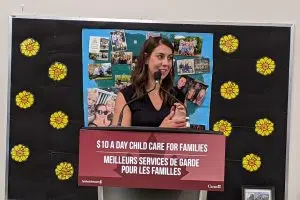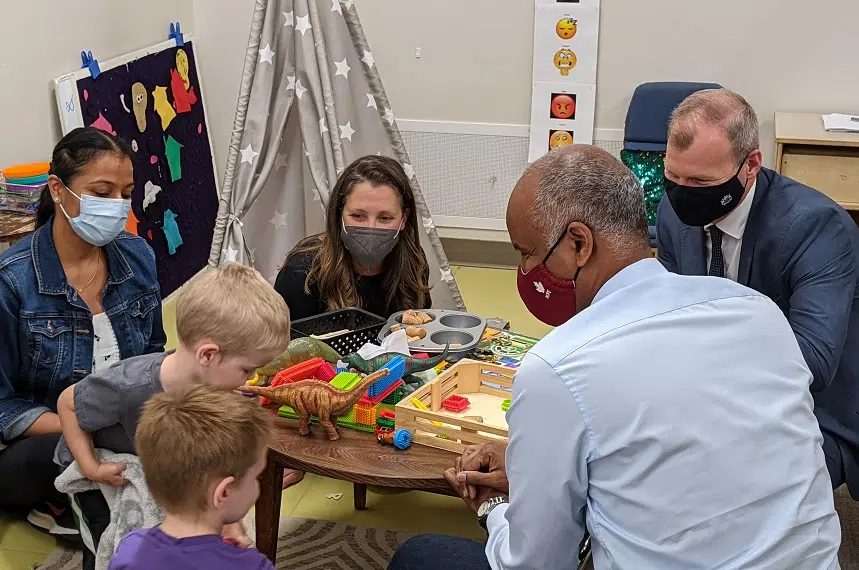Saskatchewan has signed on to a deal that will give families in the province access to $10-a-day child-care spaces by the end of 2025-26.
Families with children under the age of six will be eligible for the plan, which was laid out by the federal government in its 2021 budget.
According to the federal government, Saskatchewan families will see a 50 per cent reduction in average fees for children under age six in regulated child care by the end of 2022.
“A child-care centre is as important to our economy, it is as much a piece of critical infrastructure, as a bridge, a road and a grain elevator,” Deputy Prime Minister Chrystia Freeland said in Regina on Friday.
Freeland said the closing of schools and child-care centres due to the COVID-19 pandemic drove women’s participation in the labour force down to its lowest level in two decades.
She said affordable child care will support women returning to work and help the economy recover.
The feds also are putting up $1.1 billion over the next five years to help create 28,000 new early learning and child-care spaces in Saskatchewan in not-for-profit child-care centres, small child-care facilities and home-based child care.
Saskatchewan Education Minister Dustin Duncan described Friday’s announcement as “historic,” adding it will change many people’s lives for the better over the next decade.
“Today is a great day for working families across Saskatchewan who depend on child care,” Duncan said. “I’m pleased to be here to officially sign this agreement with the federal government solidifying the commitment to ensure that parents of children newborn to age five will have access to affordable, quality and inclusive child care.”
Duncan said the agreement between the federal and provincial governments took only a few weeks to get finalized, taking a “full-team” approach in the process.
“There was a lot of work behind the scenes that people wouldn’t have seen,” Duncan said. “It then culminated into a pretty robust period of negotiations.
“This is a over a billion-dollar agreement that was negotiated over the course of a couple of weeks.”
The agreement also features the creation of a wage grid to ensure early childhood educators are fairly compensated and offers support for future early childhood educators with their studies and with professional development opportunities.
Members of the child-care industry were giddy about the agreement.

Saskatchewan Early Childhood Association executive director Georgia Lavallee speaks about the announcement of $10-a-day child care being announced for Saskatchewan families. (Logan Stein/980 CJME)
“I’m emotional. I have goosebumps. I’m so excited,” said Georgia Lavallee, the executive director of the Saskatchewan Early Childhood Association. “This is a really fantastic opportunity for all families in Saskatchewan and our society.”
Lavallee is a big supporter of all facets of the plan. Mainly, she believes the subsidies will allow more parents to enrol their kids into daycares and other facilities.
“Early learning and child care is a right for every child, and so now every child in our province will have this opportunity. It’s amazing,” she said.
Care can also be a major cost for some families, according to Lavallee.
“We have had anecdotal reports that people are paying more for early learning and child care than they are for their mortgage,” said Lavallee, who also was glad to hear about the coming pay raises for people working in the industry.
The federal and provincial governments also announced they’ve reached an agreement to extend the Canada-Saskatchewan Early Learning and Child Care Agreement, which was signed in 2017.
The Government of Canada will provide more than $68.5 million over the next four years to increase access to affordable child-care spaces. As well, the feds are to provide Saskatchewan with a one-time investment of more than $17 million in 2021-22 to support the early childhood workforce.
Saskatchewan is the eighth province/territory to sign on to the federal deal, following Manitoba, Quebec, British Columbia, Nova Scotia, Yukon, Prince Edward Island, and Newfoundland and Labrador.
The addition of Saskatchewan means nearly half of Canadian children will be covered by the deal, Freeland said.
A potential problem
But Lavallee is worried that a federal election reportedly being called Sunday could throw a wrench in the plans.
“We are nervous … The news of a federal election is a little bit scary for us. There is a chance that everything could change,” she said before Friday’s announcement.
However, given how many provinces and territories have signed on already, she’s still optimistic the changes will go through.
“We’re hoping that all political parties within our country will then have a better support for early learning and child care,” she said.
A massive $30-billion price tag on a program like this will either lead to a raise in taxes or a higher federal debt. However, Lavallee doesn’t see that as a problem.
“Investment into a national early learning and child-care system like this would actually promote economic growth. Although the federal government and provincial government will be putting money into this, they will see more revenue out of this,” she suggested.
“It will stimulate higher tax revenue … It will support the labour market (because) it’s going to empower women to re-enter the workforce.”
— With files from 980 CJME’s Dominick Lucyk and Logan Stein and The Canadian Press











